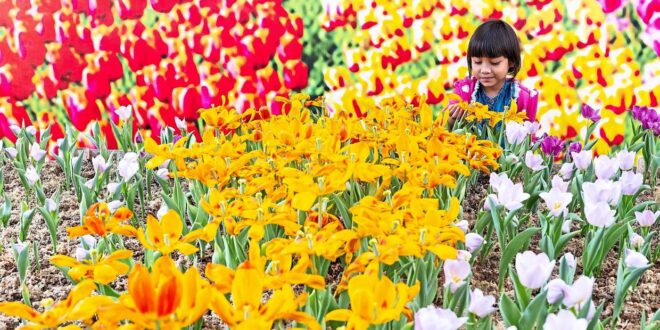CAMERON HIGHLANDS: In the picturesque landscape of Cameron Highlands in Pahang, tulips, the national flower of Turkiye and the Netherlands, have burst into a riot of colours, capturing the hearts of many.Over 2,500 tulips are thriving on Malaysian soil; their full bloom strangely attributed to the country’s warm climate.
Lokmanulhakim Basiron, the general manager of the Malaysian Agricultural Research and Development Institute (Mardi) station in Cameron Highlands, said this marks their third consecutive year of cultivating tulips at the Mardi Agro Technology Park.
The tulips have found an unexpected home in the tropics here and become an annual attraction, drawing visitors keen on witnessing the blooms up close.Originating from Iran and Turkiye, these tulips undergo seed breeding technology led by the Netherlands, where the bulbs are imported from.
“The Cameron Highlands Mardi Agro Technology Park planted 300 tulips in February 2022 at the Cameron Mini Flower Garden in conjunction with the school holidays.
“In February last year, we planted 1,500 bulbs. This February (we did) 2,500 bulbs,” he said when met at the park recently.
Lokmanulhakim explained that tulips bloom gradually, displaying colours within a period of five to 10 days after being transplanted into warm soil. However, they continue to bloom for a duration of two to three weeks, depending on weather conditions.He said the ideal temperature for growing them is below 12°C. The flower has a temperature tolerance limit of up to 29°C.
“Tulips need more direct sunlight either in the morning or evening. They do not do well in high heat. The soil must have good drainage, a neutral to slightly acidic pH, and be fertile and dry or sandy,” he added.Lokmanulhakim said that after the end of the flowering period, the stems and leaves must wilt naturally and turn yellow or brown before they are removed from the soil.
If the leaves are removed while still green, there will be insufficient food in the bulbs to bloom the following year, he said.
“Cleaned tulip bulbs are stored in mesh bags at below 5°C in a cold room for 12 weeks to six months during their dormant or inactive phase.“Then they are transferred to Leca (lightweight expanded clay aggregate) balls, a type of medium for rooting, at room temperature for a fortnight. After that, the bulbs are placed in a planting medium such as peatgrow for three to four weeks to encourage growth before being transferred to the display site,” he said.In addition to the tulip festival, a variety of Mediterranean fruits such as apples, pears, grapes and strawberries will be featured as part of the attraction.
Popular flowers such as camellias, dahlias, petunias, lilies and roses will also be on display.
Entrance fees are priced at RM5 for children and senior citizens, while tickets are priced at RM10 for adults and are free for the disabled.
 BeritaKini.biz Berita Viral Terkini di Malaysia
BeritaKini.biz Berita Viral Terkini di Malaysia





